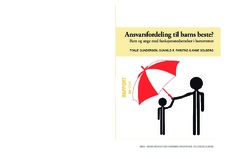| dc.description.abstract | This report aims to contribute to the hitherto scarce knowledge of disabled children and young people who are under the auspices of the child protection services. What characterizes their situation? What are their and their carers’ needs, and what kinds of challenges and opportunities do they experience? These are central questions in the study presented here. Due to the scarcity of research regarding this group of children and youth in Norway, we have chosen to conduct an explorative study in order to identify important topics and challenges. The report explores the experiences of young people who have been under placement by the child protection services, of their foster parents, and of employees within the child protection services. We have interviewed 28 people in all. Because of their different positions in relation to the topic, their experiences vary and to some extent diverge. However, our analyses reveal that one common experience is that the premises laid down by economic and administrative rules have consequences for how the employees of the child protection services carry out their work among disabled children and youth. In Norway, disabled children experiencing deficit of parental care have rights according to different legal acts. For instance, The Child Welfare Act regulates children’s and youth’s rights to help and care measurements due to failure of parental care, while their need for services because of disability are regulated by the Social Services act. These acts are administered by different governmental departments, which also have different budgets. For disabled children and youth this implies that responsibilities and payments for the services they need are divided between different governmental departments. In the interviews with the employees, they reported spending much time and effort, first selecting measures when a disabled child or young person was in need of child protection, and then to sort out which departments were responsible for providing the different services. They also said they found it complicated to determine whether the difficult situation for the child was caused by parents lacking proper parental skills, or if it was caused by insufficient support from other governmental services, e.g. respite care. The young adults interviewed in this study had been placed outside home by the child protection authorities reported that the neglect they were subject to was related to their impairments. Their disability also partly made them take the blame for their parents’ neglect or maltreatment of them. They also experienced that child protection services’ decisions to remove them from their home were delayed because of the disabilities. Being taken out of their parental home was experienced as an immediate improvement of their life situation. However, whether they were placed in an institution run by the child protection authorities or in a home for disabled children, they found that the staff lacked a combined expertise regarding the combination of disability and being subject to parental neglect or maltreatment. One of the informants was placed in foster care; something that he stated “saved his life”. One common experience among the three informants was that they were met with low expectations from employees in the child protection services, regarding their educational and work aspirations. They also found the child protection services to give priority to economic concerns rather than to their best interests; this, the informants said, had confirmed to them that they not only were a burden to their parents, but also to society. The foster parents interviewed showed a strong attachment and engagement in their foster children’s welfare. All the foster parents in the nine foster homes had previous experience, either with being parents or foster parents to disabled children. They all reported that when the foster child first arrived, the cooperation with the child protection services worked well. They came to an agreement regarding compensation for costs and salary, and the child received all the necessary services. They all said that they thought the contract they had agreed on would last as long as they were foster parents; something they envisioned would be for many years. In the first two to three years, they were regularly followed up by a caseworker, then these visits became fewer and fewer. Most of the foster parents reacted negatively to this change, seeing it as a growing disinterest in them and the foster child’s situation. Previous research shows that parents of disabled children often experience great difficulties in obtaining sufficient services and economic support. The foster parents in this study said they saw the child protection services as an assurance that they would continually be receiving needed services and economic support. However, most of them said that after a few years the child protection services wanted to renegotiate the contracts, making them less favourable for the foster parents. According to the foster parents the child protection services argued that the disability was no longer their responsibility, and that the foster parents’ from now on had to apply for services and economic compensation in the same way as ordinary parents of disabled children. The foster parents experienced this as an attempt from the child protection services to evade their responsibility and going back on their promises. Nevertheless, the foster parents’ negative feelings were not necessarily directed at their case worker, a person they often felt was sympathetic to their situation, but rather at the system which seemed to make the case workers incapable of acting in favour of the converging interests of the child and the foster parents. In the cases where the foster parents stated that continued co-operation with the child protection services worked well, the case worker seemed to have gone beyond his or her authority. | en |
